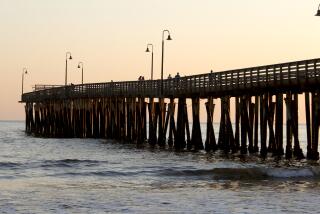HUNTINGTON BEACH : Bolsa Chica Project Draws Indian Protest
- Share via
Two representatives of the Gabrieleno Indian tribe, the original inhabitants of much of which is now Los Angeles and Orange counties, appeared at a hearing here Wednesday to protest proposed development of land in the Bolsa Chica area.
Vera Rocha, who identified herself as chief of the 3,000 Gabrielenos in California, spoke against the Koll Co. plan to build up to 4,884 houses on vacant land around the Bolsa Chica Ecological Preserve. Rocha and her husband, Manuel, told the hearing that the land was an ancient Gabrieleno burial ground.
“We are the people of the land,” said Vera Rocha. “We are concerned about destruction of our (Gabrieleno) burial sites and our sacred sites.”
She and her husband, in separate testimony, both charged that their tribe had not been adequately consulted about the proposed development.
But later, during an interview, Susan Hori, a land-use attorney for the Koll Co., said that the firm had contacted both the Gabrieleno and Juaneno tribes about the proposed project.
“There is no line of clear demarcation of where the two tribes once lived, and so we contacted them both,” said Hori. “We offered both the opportunity to have some representative present when any excavation work is done. The Juanenos accepted, but the Gabrielenos did not accept our offer.”
Others who spoke against the project at Wednesday’s hearing on the plan’s environmental impact report included Don Chisholm, a political science professor at UCLA who was representing the Surfrider Foundation. Chisholm noted that the Surfrider Foundation, based in Huntington Beach, works to protect the ocean and its beaches. He charged that the Koll project would ruin part of the strand in the Huntington Beach area.
“Huntington Beach calls itself Surf City,” Chisholm said. He added that the Koll development would “have a significant impact on surfers” because of a proposed ocean channel into the wetlands.
Those who testified included supporters of the project, such as Robert Feldmeth, director of the Roberts Environmental Center at Claremont McKenna College. Feldmeth said degraded wetlands are rapidly deteriorating and need restoration as soon as possible. The Koll project calls for restoring up to 1,000 acres of degraded wetlands. Feldmeth recently completed a study for the Koll Co. that supported work for such wetlands restoration.
Ralph Bauer, spokesman for CoOp, a group that opposes the Koll project, gave a lengthy statement that accused the environmental impact report of being inadequate.
Koll Co. officials said after the hearing that they feel the project is environmentally sound and is necessary for preservation of the wetlands.
Lucy Dunn, company vice president, noted that the development project stems from the historic 1989 intergovernmental compromise called the Bolsa Chica Coalition. That coalition ended 20 years of disputes by agreeing on a proposed development plan that would allow a maximum of 5,700 homes to be built on vacant land in exchange for preserving most of the Bolsa Chica wetlands. The Amigos de Bolsa Chica, a major environmental group, were part of that 1989 coalition.
“The Bolsa Chica Coalition plan continues to be the best all-around alternative for Bolsa Chica in view of economic feasibility, local housing needs, land-use balance and achieving wetlands restoration goals,” Dunn said.
More to Read
Sign up for Essential California
The most important California stories and recommendations in your inbox every morning.
You may occasionally receive promotional content from the Los Angeles Times.










